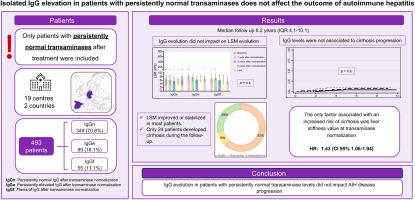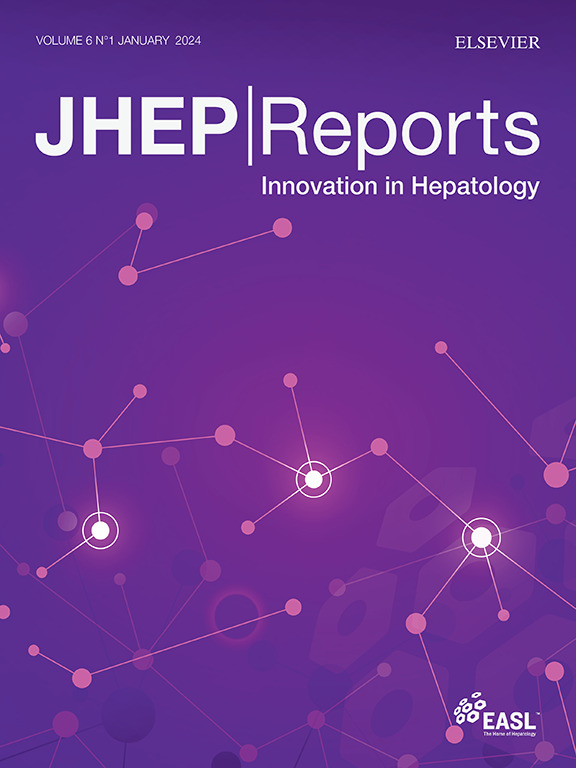转氨酶持续正常的患者的IgG升高不影响自身免疫性肝炎的预后
IF 7.5
1区 医学
Q1 GASTROENTEROLOGY & HEPATOLOGY
引用次数: 0
摘要
背景和目的自身免疫性肝炎治疗的目标是实现完全的生化反应,定义为转氨酶和免疫球蛋白G (IgG)水平的正常化。最近的数据表明,IgG正常化对生存率没有显著影响。我们评估了持续升高的IgG水平(IgGe)和IgG耀斑(IgGf)对纤维化进展和肝硬化发展的影响。方法回顾性多中心队列研究纳入493例自身免疫性肝炎患者,随访期间转氨酶水平持续正常。采用治疗加权逆概率(IPTW)倾向评分法平衡队列。结果随访期间IgG (IgGn)持续正常349例(70.8%),IgGe 89例(18.1%),IgGf 55例(11.1%)。在转氨酶水平正常的中位随访6.2年(IQR 4.1-10.1年)后,中位肝硬度测量(LSM)值保持稳定,组间无显著差异。随访期间,24名患者出现肝硬化。肝硬化的预测因素为诊断时年龄(危险比[HR] 1.10, p <0.001)、白蛋白(危险比[HR] 0.20, p <0.001)、IgG(危险比[HR] 1.00, p = 0.001)和血小板计数(危险比[HR] 0.99, p = 0.001);转氨酶正常化时LSM (HR 1.30, p <0.001);6个月转氨酶恢复正常(HR 0.24, p = 0.025)。在多变量分析中,只有LSM与肝硬化的高风险独立相关。IPTW应用后,升高的IgG (IgGe或IgGf)不影响纤维化进展(p = 0.275)或肝硬化发展(p = 0.211)。结论在转氨酶水平正常的患者中,持续或暂时的血清IgG升高不会显著影响自身免疫性肝炎疾病的进展,因此挑战了目前完全生化反应的定义。影响和意义越来越多的证据表明免疫球蛋白G (IgG)值对自身免疫性肝炎(AIH)患者预后的影响较小。然而,仍然缺乏关于长期结果的可靠信息,特别是在实现持续转氨酶正常化的患者中。在转氨酶持续正常的患者中,持续升高的IgG或IgG耀斑似乎不影响AIH患者的预后。这些结果挑战了目前AIH患者完全生化反应的定义。转氨酶水平正常化似乎是最好的治疗终点。本文章由计算机程序翻译,如有差异,请以英文原文为准。

Isolated IgG elevation in patients with persistently normal transaminases does not affect the outcome of autoimmune hepatitis
Background & Aims
The goal of treatment for autoimmune hepatitis is to achieve a complete biochemical response, defined as normalization of transaminases and immunoglobulin G (IgG) levels. Recent data suggest that IgG normalization does not significantly affect survival. We evaluated the impact of persistently elevated IgG levels (IgGe) and IgG flares (IgGf) on fibrosis progression and cirrhosis development.
Methods
This retrospective multicenter cohort study included 493 patients with autoimmune hepatitis and persistently normal transaminase levels during follow-up. The inverse probability of treatment weighting (IPTW) propensity score method was used to balance the cohorts.
Results
Three hundred forty-nine (70.8%) patients had persistently normal IgG (IgGn) levels, 89 (18.1%) had IgGe, and 55 (11.1%) had IgGf during follow-up. After a median follow-up of 6.2 years (IQR 4.1–10.1 years) with normal transaminase levels, median liver stiffness measurement (LSM) values remained stable, with no significant differences between groups. During the follow-up, 24 patients developed cirrhosis. Predictive factors for cirrhosis were age (hazard ratio [HR] 1.10, p <0.001), albumin (HR 0.20, p <0.001), IgG (HR 1.00, p = 0.001), and platelet count (HR 0.99, p = 0.001) at diagnosis; LSM (HR 1.30, p <0.001) at transaminase normalization; and transaminase normalization at 6 months (HR 0.24, p = 0.025). In the multivariate analysis, only LSM was independently associated with a higher risk of developing cirrhosis. After IPTW application, elevated IgG (IgGe or IgGf) did not affect fibrosis progression (p = 0.275) or cirrhosis development (p = 0.211).
Conclusions
Persistent or temporary serum IgG elevation in patients with normal transaminase levels did not significantly affect autoimmune hepatitis disease progression, thus challenging the current definition of complete biochemical response.
Impact and implications
The body of evidence showing a lesser impact of immunoglobulin G (IgG)values on outcomes in patients with autoimmune hepatitis (AIH) is growing. However, there is still a lack of robust information on the long-term outcomes, especially in patients who achieve persistent transaminase normalization. Persistently elevated IgG or IgG flares in patients with persistently normal transaminases do not seem to affect outcomes in patients with AIH. These results challenge the current definition of complete biochemical response in patients with AIH. Transaminase level normalization appeared to be the best treatment endpoint.
求助全文
通过发布文献求助,成功后即可免费获取论文全文。
去求助
来源期刊

JHEP Reports
GASTROENTEROLOGY & HEPATOLOGY-
CiteScore
12.40
自引率
2.40%
发文量
161
审稿时长
36 days
期刊介绍:
JHEP Reports is an open access journal that is affiliated with the European Association for the Study of the Liver (EASL). It serves as a companion journal to the highly respected Journal of Hepatology.
The primary objective of JHEP Reports is to publish original papers and reviews that contribute to the advancement of knowledge in the field of liver diseases. The journal covers a wide range of topics, including basic, translational, and clinical research. It also focuses on global issues in hepatology, with particular emphasis on areas such as clinical trials, novel diagnostics, precision medicine and therapeutics, cancer research, cellular and molecular studies, artificial intelligence, microbiome research, epidemiology, and cutting-edge technologies.
In summary, JHEP Reports is dedicated to promoting scientific discoveries and innovations in liver diseases through the publication of high-quality research papers and reviews covering various aspects of hepatology.
 求助内容:
求助内容: 应助结果提醒方式:
应助结果提醒方式:


